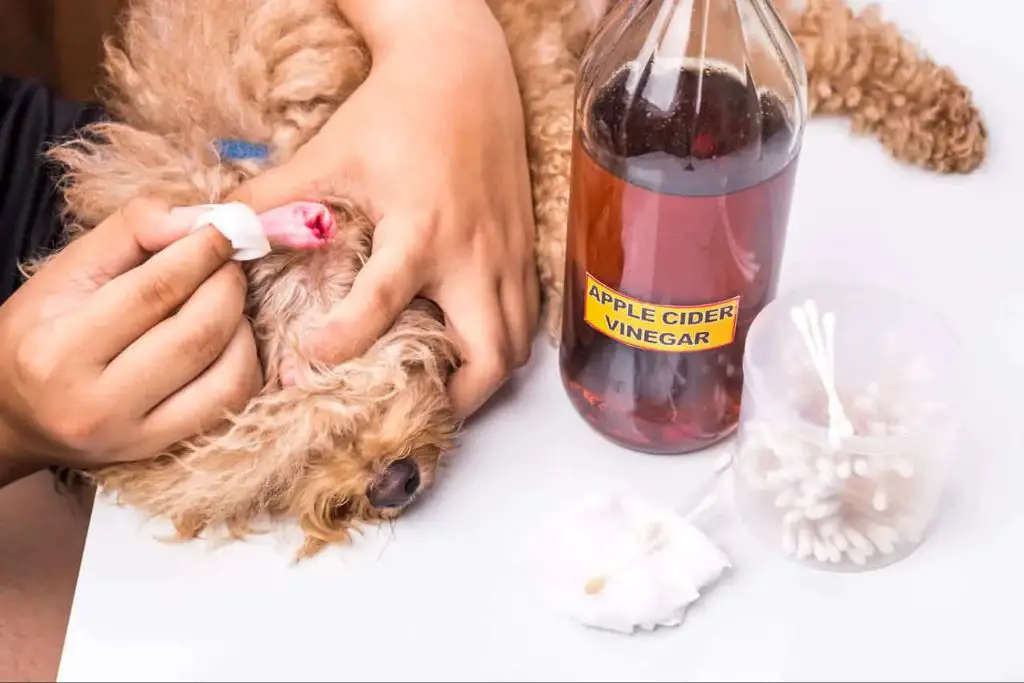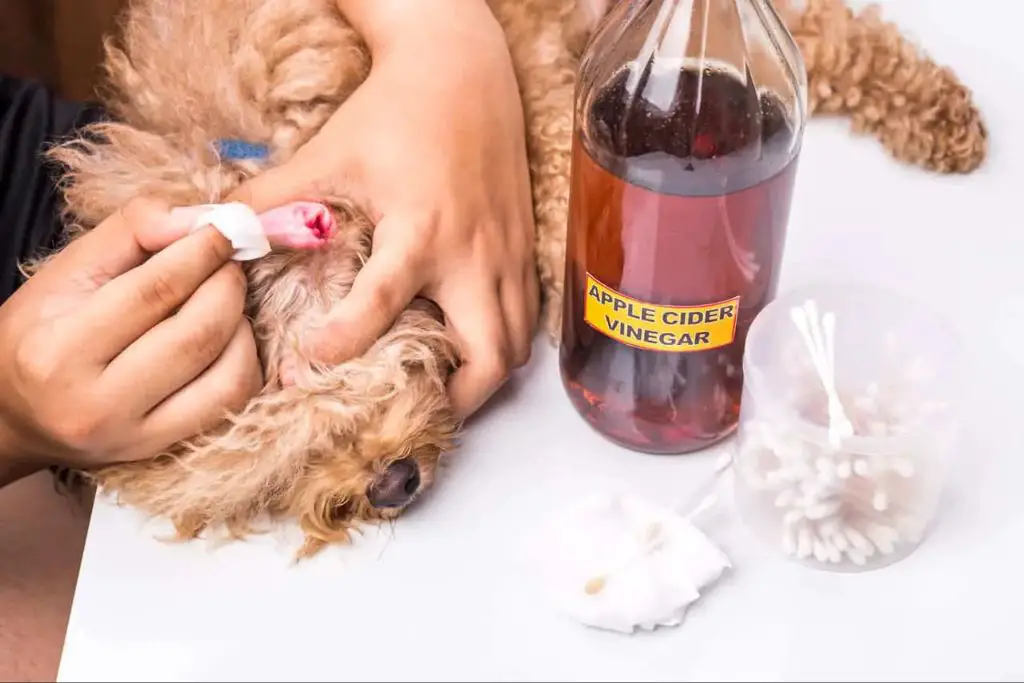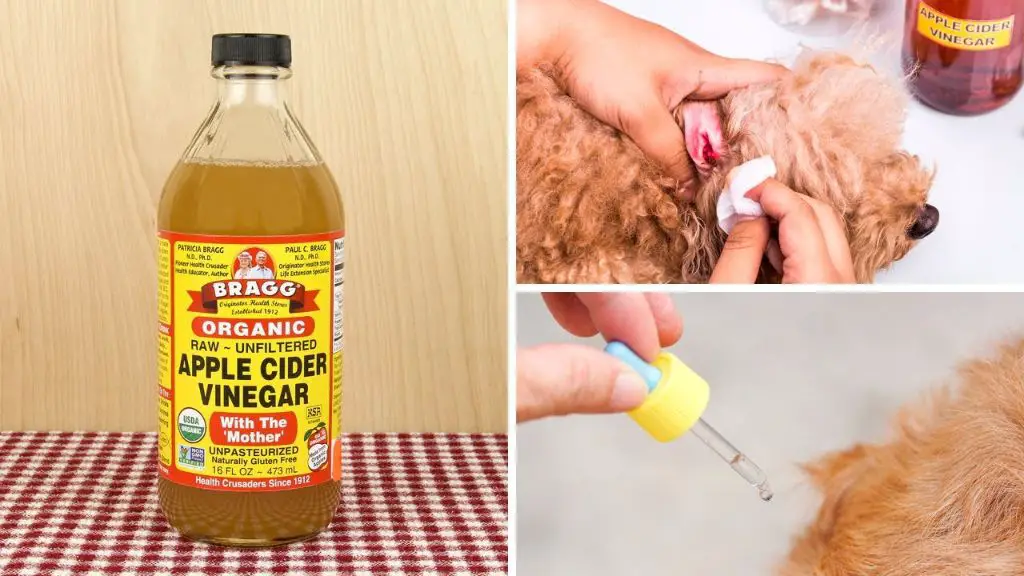Is Vinegar Safe for Dogs?
Vinegar can be used safely on dogs to help repel mosquitoes, but proper dilution and application is important. When used correctly, vinegar is gentle and non-toxic for dogs. However, vinegar should always be diluted before applying it to your dog’s skin. Undiluted vinegar can irritate eyes and ears. You’ll want to avoid getting undiluted vinegar into your dog’s eyes, ears, nostrils, or mouth.

As long as the vinegar is adequately diluted and care is taken to avoid sensitive areas, it can be a safe and effective mosquito repellent for dogs. Start with smaller concentrations first to monitor your dog’s reaction. Most dogs tolerate diluted vinegar well, but discontinue use if signs of skin irritation occur.
How Vinegar Repels Mosquitoes
Vinegar is able to repel mosquitoes because of its acidic nature. The main active ingredient in vinegar is acetic acid, which has an irritating effect on insects. Mosquitoes locate hosts through sensing carbon dioxide, body odors, warmth, and moisture. The strong scent released by acetic acid overwhelms and confuses their senses so they are unable to hone in on their targets effectively.
Additionally, mosquitoes taste with their legs, and vinegar alters the pH on skin and fur, making it unappealing for them to land. The acetic acid can also damage the outer cuticle of insects on contact, further deterring them from biting. Overall, vinegar is an irritant that makes it difficult for mosquitoes to utilize their prime sensory cues when searching for a blood meal.
Using Vinegar on Dogs for Mosquitoes
Using diluted vinegar can be an effective mosquito repellent for dogs. Vinegar works to mask a dog’s natural body odor, which helps deter mosquitoes from landing on them. The acetic acid in vinegar also emits a scent that bugs don’t like. However, there are some pros and cons to consider when using vinegar on dogs:
Pros:
- Natural and non-toxic – Vinegar is generally safe for dogs when diluted properly.
- Cheap and readily available.
- Provides a protective barrier against mosquitoes.
- Won’t stain or damage fur.
- Some dogs tolerate the smell of vinegar well.
Cons:
- Some dogs strongly dislike the smell.
- Can be irritating if not diluted correctly.
- Needs to be reapplied frequently.
- Doesn’t work well for all dogs.
- Less effective than chemical repellents.
Potential risks of using vinegar on dogs include skin irritation or allergic reactions if not diluted properly. Always start with a high dilution ratio first. Some dogs may be sensitive to the strong odor of vinegar. As with any new product, monitor your dog closely when first using a vinegar spray to watch for any adverse reactions. Avoid getting vinegar in the eyes, nose or mouth. Seek veterinary advice if you have concerns.
Dilution Ratios for Dogs
When using vinegar as a repellent for dogs, it’s important to dilute it properly. Straight vinegar can be too harsh for a dog’s sensitive skin. The recommended dilution is:

- For most dogs: 1 part vinegar to 3 parts water
- For dogs with sensitive skin: 1 part vinegar to 5 parts water
Always start with a higher dilution ratio, especially if you’ve never used vinegar on your dog before. Monitor your dog’s skin for signs of irritation. If their skin seems dry, itchy or inflamed after application, try a higher dilution ratio next time.
Avoid getting undiluted vinegar directly in your dog’s eyes or mucous membranes. Opt for spraying it onto a cloth first before gently wiping their fur.
It’s better to initially use a weaker mix and increase potency if needed. Remember that dogs have a heightened sense of smell, so start with a lower concentration of vinegar.
Application Tips
When applying a diluted vinegar solution to your dog, focus on areas where mosquitoes tend to bite most frequently. These high-risk zones include:
- Around the ears
- Under the belly
- Between the toes
- On the inner thighs
Avoid getting vinegar in your dog’s eyes, nose, or mouth. Start by spraying a small amount on your hand first to test for skin irritation before applying all over. It’s also wise to spray a little on one area of skin initially to see how your dog reacts.
Reapply the vinegar solution once a day or every few hours if your dog goes swimming or is outside for extended periods. More frequent applications may be needed for high mosquito exposure. However, take care not to overuse vinegar, as too much can dry out your dog’s skin and coat.

Safety Precautions
When using vinegar on dogs as a mosquito repellent, it’s important to take some safety precautions. Vinegar can cause irritation, so you’ll want to avoid getting it in your dog’s eyes, ears, nose, or other sensitive areas. Be very careful when applying diluted vinegar not to spray it directly into the face. Focus application on the back, belly, legs and paws.
It’s also a good idea to monitor your dog’s skin after applying a vinegar solution. Look for signs of irritation like redness, bumps, or scratching. Discontinue use if irritation occurs. Every dog’s skin is different in terms of sensitivity. What works fine for one dog may cause a reaction in another. Start with very diluted vinegar and do a patch test before wider application.
Vinegar should not cause harm when properly diluted and safely applied, but it’s always wise to exercise caution with any topical treatment on pets. Be sure to keep vinegar away from open wounds or broken skin. Avoid getting it in the mouth or drinking water. And as with any mosquito repellent product, always consult your veterinarian if you have any concerns about using it on your pet.
Other Repellents for Dogs
In addition to vinegar, there are other natural repellents that can help protect dogs from mosquitoes without the harsh chemicals found in many over-the-counter products. Some other options to consider include:
Essential Oils – Certain essential oils like citronella, peppermint, eucalyptus, and lemongrass have natural insect repellent properties. These can be diluted and applied topically on dogs. However, it’s important to research safety and proper dilution amounts before using on dogs, as some essential oils can be toxic to pets if used incorrectly.
Apple Cider Vinegar – Apple cider vinegar contains acetic acid which can repel insects when applied topically on dogs. It provides a smell that mosquitoes don’t like. Dilute before use and rinse off after outings.
Natural Sprays – There are some commercial natural sprays made with essential oils, herbal extracts, and other plant-based ingredients specifically formulated to repel mosquitoes on dogs. These are often safer than chemical-based repellents.
Oral Supplements – Some oral supplements for dogs contain garlic, brewer’s yeast, vitamin B1, and other natural components that can help repel mosquitoes when ingested. However, consult a vet first, as garlic can be toxic to dogs in large amounts.
Checking with a veterinarian before trying any new natural repellent on dogs is advised. And always monitor dogs closely for any signs of irritation or allergic reaction when using repellents topically.
Mosquito Protection for Dogs
There are several ways to help protect your dog from mosquito bites besides using repellents:
-
Avoid taking your dog outside during peak mosquito hours around dawn and dusk when mosquitoes are most active.
-
Install mosquito netting in your yard or porch area to create a safe outdoor space for your dog.
-
Keep your dog inside during excessive mosquito seasons or in mosquito-prone areas.
-
Use a leash when walking your dog to avoid letting them wander into mosquito hot zones.
-
Remove any standing water sources around your home to minimize mosquito breeding grounds.
-
Use mosquito traps, bug zappers or other devices to reduce the mosquito population around your home.
-
Keep your dog well-groomed and bathed as mosquitoes are less attracted to clean coats.
-
Ask your vet about supplements or alternatives if your dog cannot tolerate topical repellents.
Taking some simple precautions can go a long way towards protecting dogs from mosquito-borne illnesses and uncomfortable bites during mosquito season.
When to See a Vet
While most mosquito bites on dogs don’t require medical attention, there are some signs that indicate a vet visit is needed. Seek veterinary care immediately if your dog experiences any of the following after a mosquito bite:

- Swelling or hives that continue to worsen
- Difficulty breathing
- Loss of appetite
- Vomiting or diarrhea
- Lethargy
- Fever
- Pus, redness, or continued irritation around bite sites
- Painful swelling of the face or muzzle
- Coughing
- Jaundice (yellowing of gums, skin or eyes)
These reactions may indicate a more serious condition like an infection or allergic reaction requiring prompt veterinary attention. It’s always better to be safe than sorry when it comes to your dog’s health and comfort.
Summary
Vinegar is generally considered a safe and effective mosquito repellent to use on dogs when diluted properly. The acetic acid in vinegar helps block mosquitoes’ sense of smell and create an unpleasant odor that deters them from landing on your dog. Diluted vinegar sprayed directly onto the coat and skin can offer protection against bites for a couple of hours.
Before applying vinegar to your dog, always dilute it first with purified water at a minimum 1:1 ratio for general use. Use caution around the eyes, nose, and mouth, test for skin irritation, and avoid repeated daily application. Puppies under 8 weeks may be more sensitive. As an extra precaution for young, old, or sick dogs, consult a veterinarian. Monitor your dog’s behavior and skin reaction for any signs of discomfort.
Vinegar can provide a safe, affordable way to help repel mosquitoes from dogs when used properly. Along with other precautions like avoiding peak mosquito hours and eliminating standing water sources, a diluted vinegar spray can give dogs added protection during mosquito season.